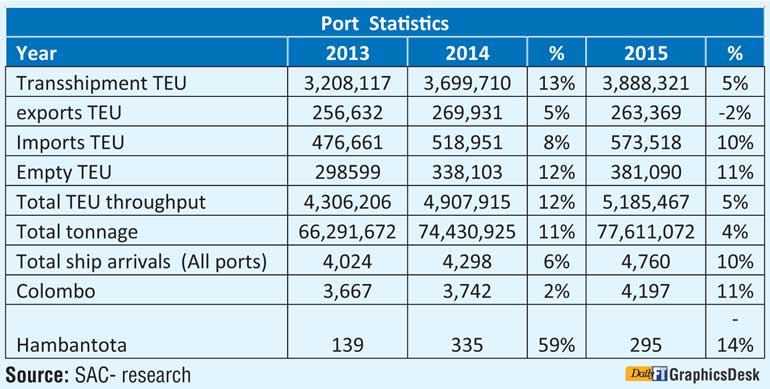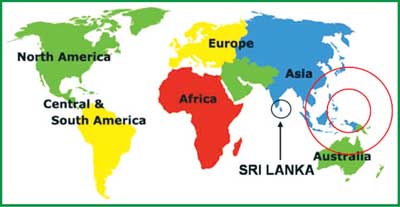Monday Feb 23, 2026
Monday Feb 23, 2026
Thursday, 11 February 2016 00:10 - - {{hitsCtrl.values.hits}}


Amidst a tough external and domestic environment, Sri Lanka’s shipping industry has grown beyond expectations. The growth in ship arrivals, growth in tonnage and the growth in throughput have all reached positive numbers by the end of 2015.
Considering the tremendous challenges in Asia, and the continuous global uncertainty and slow down, the ports of Sri Lanka tend to attract more business when analysing the data of the past three years.
Undoubtedly this is not because of anything else but the fact that we are probably located in the best geography of the whole planet for a shipping hub. If one looks at the world map, one would not question about the statement we made.
However we have also the biggest drawbacks in terms of policy, reforms, political and economic uncertainty, and rule of law within the country that has taken us back a few decades. Probably the country is better positioned to be than Singapore or Dubai in the 21st century, if it’s put on the right track once again.
We have seen many views and critical viewpoints and negative sentiments of the SLPA in the recent past which I believe should be considered as constructive criticism and a good eye opener to the SLPA. Importantly as a country the core activities of shipping remains positive giving SLPA and its terminal operators to be somewhat happy and should encourage them to work even harder to retain our growth momentum in the coming year as well.
Port of Colombo and the SLPA should see new opportunities as trade patterns may change from 2016-2020 period. Sri Lanka has more to gain than to lose. Increasing port efficiency, offer more services to ship owners, develop new services and canvas for frequency increases by main line operators would be some of our targets for the next 5 years.
Growth of Sri Lanka ports business is relatively remarkable as shown above. As the largest transhipment port in South East Asia, Singapore and many other ports saw its volumes go down. The port of Colombo had an over 5% transhipment growth in 2016. Colombo terminals do have world class facilities, and have shown high productivity and can offer to the future in terms of both capacity and reliability for ship owners. The only negative numbers are export growth which should be the number one concern and  priority for the government and the reduction in vehicle transhipment in Hambantota which is obviously a reflection of the global slowdown.
priority for the government and the reduction in vehicle transhipment in Hambantota which is obviously a reflection of the global slowdown.
The freight market remains historically very low from Asia to EU and US, this may slightly change by the end of the year as the demand supply may start to change over the next three years as indicated by ship order books, however the reduction in freight rate revenue are balanced by the bunker prices tumbling over the last 12 months. The freight and the shipping market volatility continued since the 2008 global economic crisis and the cycle still remains unpredictable.
Given the current developments and slowdown in China, the year 2016 will be challenging to Asian ports and shipping industry, but on the brighter side, India, Myanmar, East Africa are emerging and the U.S economy is slowly picking up. It is our view that Iran coming out of economic sanctions will keep oil prices relatively low over the medium term and as a result consumption in Europe should increase. Lower bunker prices will help shipping lines to mitigate lower freight rates and help generate greater and new business opportunities.
In our opinion given this current context globally (without more surprises in fundamentals), shipping industry will further consolidate over the next five years, freight rates will increase gradually on key shipping routes starting from end 2016, and the outlook is more optimistic for the next five years.
In this background the local ports industry should think positively and be focused to service the industry keeping in mind the constant need to be “globally competitive” to service world trade and market our ports which in our opinion is not done adequately. The Government must ensure that the conducive environment should be created on their part for the country to succeed as a maritime nation.